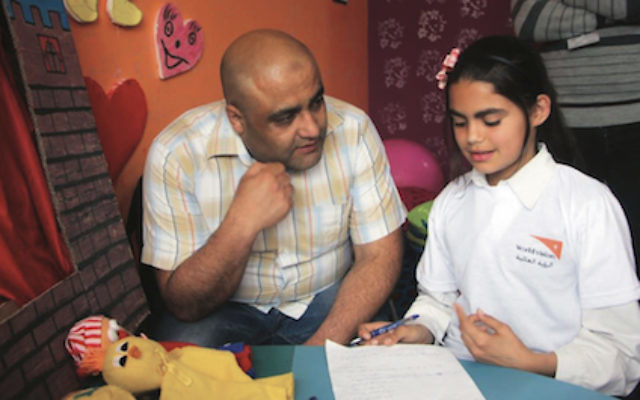‘World Vision completely opposes terrorism’
When the prophet Micah asked what does the Lord require of you, the answer was beautiful in its simplicity: “Walk humbly with your God, love mercy and do justice.”
When the prophet Micah asked what does the Lord require of you, the answer was beautiful in its simplicity: “Walk humbly with your God, love mercy and do justice.”
It is this that we are asking for now in Israel, where World Vision employee Mohammed El-Halabi faces charges of funnelling humanitarian aid to Hamas. These are extremely serious allegations, but as yet untested. Justice requires a fair and open trial, in which the evidence can be tested and the accused heard. Instead it has been decided to try Mohammed El-Halabi in secret.
Even last month’s pre-trial hearing was held in camera; media and World Vision staff were barred from attending. Although a closed trial may not be unusual in Israel for such a case, in most democracies where a trial may involve information sensitive to the state’s security, the more accepted practice is for it to be held in an open court, which can then be closed at the judge’s discretion for sensitive witnesses or evidence.
World Vision, no less than Israel, wants to know the truth of this. We have no tolerance for staff who act fraudulently and our systems are rigorous, designed to make the sort of fraud being alleged just not possible. We are, of course, completely opposed to terrorism and those organisations who pursue such activities. We choose to work in many desperately fragile locations with very arbitrary governments, and never allow our limited resources to go to military or government authorities.
But in order to reach impoverished children suffering injustice we sometimes have to work where there are administrations that we do not support. It is because of our experience in places like Gaza, South Sudan, Afghanistan, and Somalia that World Vision knows how careful we have to be in the administration of our donor funds.
If any of our money has gone to terror – no matter the amount – we are shocked and outraged. But Mohammed El-Halabi’s alleged confession, after 50 days of detention, that he diverted 60 per cent of World Vision’s Gaza budget, up to $US50 million is hard to reconcile.
World Vision’s cumulative operating budget in Gaza for the past 10 years was approximately $US22.5 million. Under World Vision’s accountability processes, Mohammed El-Halabi’s signing authority as manager of our Gaza operations, a role he only held for the past two years, was capped at $US15,000. Regular external audits have found no monies missing.
We have now commissioned a new audit by a major international auditor to re-examine the last 10 years because we want to know the truth. As the governing authority in Gaza, Hamas is responsible for the delivery of public services to the population. Despite the obvious restraints, World Vision works with UN agencies and other NGOs to ensure the delivery of humanitarian aid does not support the Hamas administration.
In addition to our own monitoring systems, these projects have had countless monitoring visits by donor governments. World Vision work in Gaza is not a niche advocacy interest. Rather our humanitarian assistance programs in Gaza have been run with the full support of the Australian government. The political context in Gaza is agonisingly complex, but the humanitarian need is overwhelmingly clear.
Last year, our work in Jerusalem, the West Bank and Gaza directly benefited more than 92,000 children, nearly 40,000 of whom were in Gaza. These projects focused on children’s psycho-social needs, as well as providing medical and other supplies to hospitals, food relief, and re-establishing agricultural livelihoods.
We condemn all violence against children. The death of a Jewish child or a Palestinian child is an equal tragedy and injustice. Both equally carry the image of God. Justice certainly means rockets must stop being fired from Gaza into Israel, but justice also means there must be hope for Palestinian children.
The great gift of the Jewish faith to the world was justice. Unlike many other faiths, the Jewish faith emerged with a remarkable gift for self-criticism. Its prophets did not spare its own leaders and dared to suggest that God’s face was particularly revealed in the foreigner. It was a breathtaking glimpse of a universal transcendent faith that believes the image of God is revealed in all humans.
In this practice of justice, Israel was to be the beacon to the world. Deuteronomy 16:20 tells us, “Tzedek tzedek tirdof.” “Justice, justice you shall pursue” also means justice must be pursued in a just manner, in other words, the methods used to obtain justice must themselves be just.
In 2002 when I was awarded by B’nai B’rith the Raoul Wallenberg Humanitarian Award I understood it was in recognition of my stand for justice – the deepest expression of Jewish faith. It is not always an easy cause to champion.
I treasure my Raoul Wallenberg Award, and I believe if alive today Wallenberg would ask a simple question: What does justice require? I am sure he would not hesitate to say one is innocent until proven guilty and all deserve a fair and open trial.
That is the mighty river of justice, the great gift of Jewish faith.
Tim Costello is chief executive of World Vision Australia.


comments